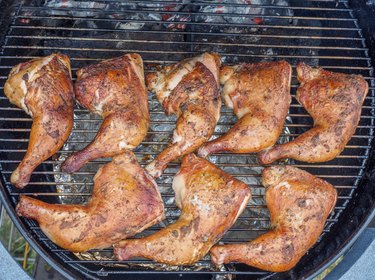
Sometimes the bones, and even the meat near the bones, can darken when you cook young chickens. This is normal and doesn't pose a health threat, according to an article written by food and nutrition specialist Julie Garden-Robinson and published on the North Dakota State University website in 2005. Despite the dark bones, the meat may still look pink even if you cook it completely. However, you may be able to reduce the darkening.
Age
Video of the Day
The bones of younger chickens between the ages of 6 and 8 weeks are the most likely to darken when cooked. This is most common in broiler-fryer chickens -- tender, young birds that weigh between 2.5 and 4.5 pounds. Any method of cooking is possible for these chickens, according to the U.S. Department of Agriculture. Smaller broiler-fryer chickens that weigh between one and two pounds are Rock Cornish game hens. When you cook these chickens, the bone marrow leaks out because the bones haven't completely hardened; this causes the darkness.
Video of the Day
Freezing
Chicken stays good in the refrigerator for only a day or two, but freezing the meat keeps it safe for consumption almost indefinitely. Freezing chicken and then slow cooking it can contribute to the bone marrow seepage that causes darkening. Porous bones allow the hemoglobin to escape, which has a dark maroon pigment that colors meat and bones. Hemoglobin is a protein found in red blood cells that transports oxygen throughout the body.
Refrigeration
You can briefly store chicken in the refrigerator instead of freezing it to help prevent bone darkening. Put raw chicken on the bottom shelf, according to Metro Health, the website of the San Antonio Metropolitan Health District of San Antonio and Bexar County, Texas. Never place any other foods under raw chicken; if the meat is cooked, store it above any raw foods. This reduces the likelihood of cross-contamination that could make you ill.
Cooking
Refrigerating chicken and precooking it helps you avoid the slow-cooking method that contributes to darkening bones. Boiling or microwaving chicken are two effective methods for precooking, according to the Alabama Cooperative Extension System of Alabama A&M University. You can then grill or barbecue the chicken for fast cooking. Don't wait after you precook the chicken to grill it. Bacteria grow more quickly in foods that aren't cooked thoroughly, increasing the risk of food poisoning.
- NBC12.com: The Color of Poultry
- USDA Food Safety and Inspection Service: The Color of Meat and Poultry
- North Dakota State University Agriculture: Food Freezing Basics: Freezing Poultry and Fish
- Medline Plus: Hemoglobin
- USDA Food Safety and Inspection Service: Chicken From Farm to Table
- Metro Health: Food Safety
- Alabama Cooperative Extension System: Roasting Food on the Grill in a Safe Manner